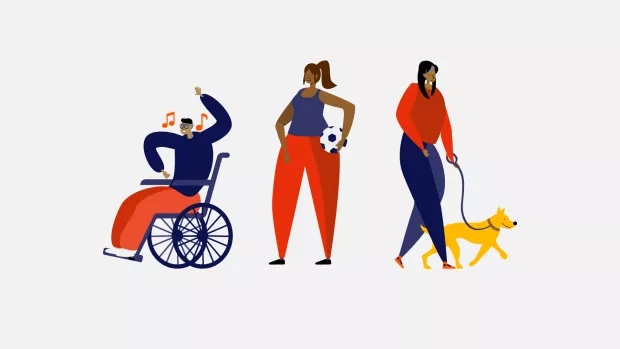
Anxiety, stress and MS
People with MS often find that stress impacts on their condition in some way.
It’s impossible to avoid it completely, but stress affects a body’s ability to fight disease – so it’s important to learn ways of managing it as much as possible.
Anxiety is also common, affecting about a third of people with MS.
MS is unpredictable, so it’s no surprise that uncertainty and a feeling of the unknown turns into anxiety. Again, there are techniques for managing anxiety.
This page also covers some common thinking errors and ways to overcome them.
Stress and MS
The effects of stress
Stress can make you feel anxious or worried, irritable, depressed or low in mood, or a sense of being overwhelmed and becoming very pessimistic. Other common experiences are sleep disturbances and nightmares. Long-term stress can cause physical problems including impaired memory, headaches and high blood pressure.
Stress is a normal part of life for everyone, but in addition to facing normal everyday stresses, people with MS have to deal with the unpredictability and pressures the condition itself causes. MS can affect many areas of life, such as the ability to work, cognitive functioning, friendships and relationships, housework and parenting.
If all these areas of functioning are being affected by your MS, it is likely you will experience more stress. It is impossible to eliminate stress totally from your life but there are many techniques you can employ to help manage it and take back control.
Ways to manage stress
Learn to recognise what you can and can't control
When you feel stressed, ask yourself ‘is this something I have any control over?’ If the answer is yes, take any action you know will relieve the stress. It might be something as simple as saying no to your boss. If the answer to your question is no, then 'let go' of the situation that is causing the stress.
Set realistic goals and plan ahead
As MS is unpredictable, having contingency plans in place for everyday activities could reduce stress if the unexpected happens.
Let those who need to know that there is a chance – however small it might be – that the MS could delay your plans.
Is your automatic reaction a true representation of what is happening?
Keep a stress diary for two months. This can help you identify the situations that cause you stress.
Record how you reacted to the difficulty that caused you stress and also how you might have been able to avoid the situation.
Exercise and complementary therapies
This can be a very useful tool in managing stress. Using your body helps to let off steam, releasing stress and anxiety. Exercise also helps with sleep and can give you more energy, both of which can help reduce your stress levels.
Find out more about exercise and MS
Find ordinary everyday activities that are enjoyable to you. Consider complementary therapies like massage, meditation, mindfulness, yoga, t’ai chi or aromatherapy.
Find out more about alternative and complimentary therapies
Relaxation and breathing
Teach yourself relaxation and calm breathing techniques. You can buy CDs and books to help you with this, or ask an MS nurse, doctor or other health professional.
Find out more about getting help from a health professional
Anxiety and MS
What is anxiety?
The body's 'fight-or-flight' response is an automatic system that enables us to respond to perceived danger and threats. When we feel fearful or stressed, the body produces adrenaline and this in turn produces physical effects.
These might include a pounding heart, excessive sweating, feeling faint or dizzy, a dry mouth, breathing difficulties, or bowel and urinary problems.
In nature, this physical response can be very useful – it prepares you for immediate action when threatened by danger. But if this heightened state of alertness continues for lengthy periods of time it can affect your health.
Coping with anxiety
The most frequently reported fears from people with MS are around future level of disability.
This is totally understandable, as – even though no one can predict the future, whether they have MS or not – it’s very difficult not to worry about it.
Some people get help from professionals to learn how to live with uncertainty, and help them minimise the impact of negative thoughts and feelings on their lives.
Others find strategies like these useful:
Live a day at a time
This doesn’t mean putting off planning or burying your head in the sand, but it might mean not thinking the worst will happen tomorrow.
Set a 'worry time'
Make an appointment with yourself to focus on worrying for five minutes each morning and evening. Remember – five minutes – no more and no less.
Write a 'coping with anxiety' list
Put it somewhere you can see it to be reminded of things you can do to help yourself.
Some ideas for what to include:
- identify your fear or anxiety and write it down
- tell someone you trust how you are feeling
- use calming breathing
- do an activity you enjoy to divert yourself
- if certain news programmes, magazines, books or people are increasing your fear and anxiety, try to avoid them for a while
- take a relaxing bath
- ask for a hug
Give up smoking (or don't start)
People who smoke often say that it helps them cope with anxiety (and stress). But smoking has been shown to make MS worse. Disability happens at a faster rate, relapsing MS turns into secondary progressive MS sooner, and people who smoke get more lesions and relapses.
In 2021 the biggest ever study into how quitting smoking affects people with MS found two important things.
- Anxiety levels were actually higher in people who carried on smoking compared to non-smokers.
- Levels of anxiety went down when people quit smoking.
Even better news was that, after quitting, there was a slowing down in how fast their walking and other movement got worse. In fact, the rate it got worse slowed to the same as it is for people who've never smoked.
'Thinking errors'
There are a number of ‘thinking errors’ people make that increase feelings of anxiety and fear.
Some of these thinking errors are:
‘Black and white’ or ‘all or nothing’ thinking
With certain symptoms, for example fatigue, it can be easy to think ‘I am so tired today I will never cope with work tomorrow. In fact, maybe I will have to stop working altogether’., it can be easy to think ‘I am so tired today I will never cope with work tomorrow. In fact, maybe I will have to stop working altogether’.
Reminding yourself that having a rest will recharge you and give you energy for tomorrow helps you take back control.
Exaggerated thinking
Focusing on something and making it larger than life. Maybe you forgot an important event or made a mistake at work due to problems you are experiencing. You start to believe ‘I am incapable of simple tasks; I am no longer a competent person’.
Actually, you successfully completed many tasks in work or at home that day but the one mistake has overshadowed all the positive achievements. For each time you think like this, replace the thought with two positive achievements.
Negative bias
Focusing on the negative. Many people with MS focus on how they were in the past and the abilities they used to have. This can overlook any positive changes in their life they may have made despite their condition.
'Should or ought’ thinking
Telling yourself that you should or ought to be able to do something. For example, ‘I should be able to walk my child to school’. Telling yourself you should be able to do, or you ought to do, only increases guilt, anger and anxiety – it is destructive not constructive.
Getting help from a professional
If the anxiety you experience feels totally overwhelming, and you can't manage it alone, you can get help – from your GP, MS nurse or other health or social care professional.
You may find it helpful to talk to a clinical psychologist who understands MS and anxiety or fear. They can help you find ways to change your thinking styles.





